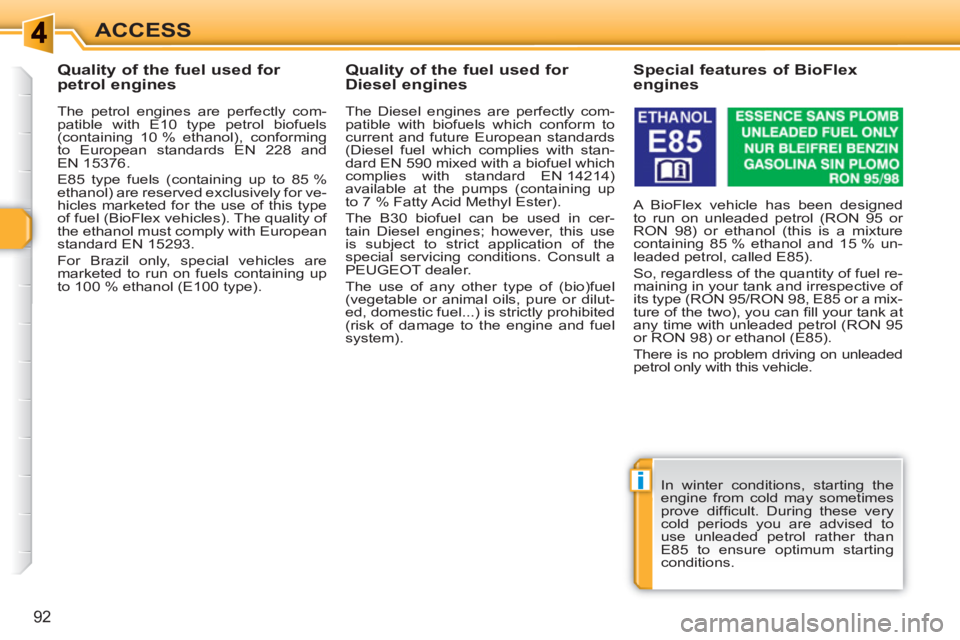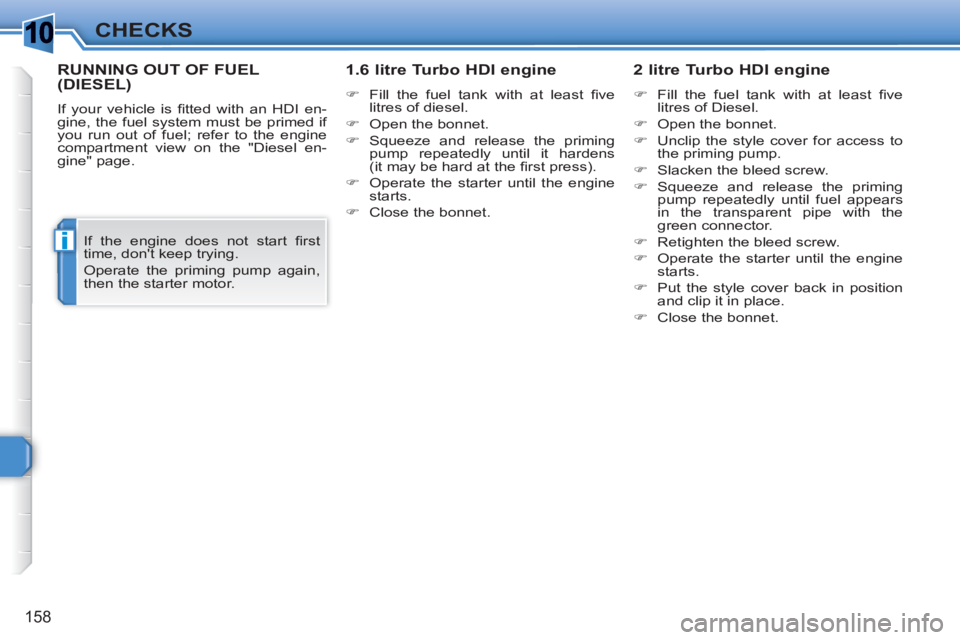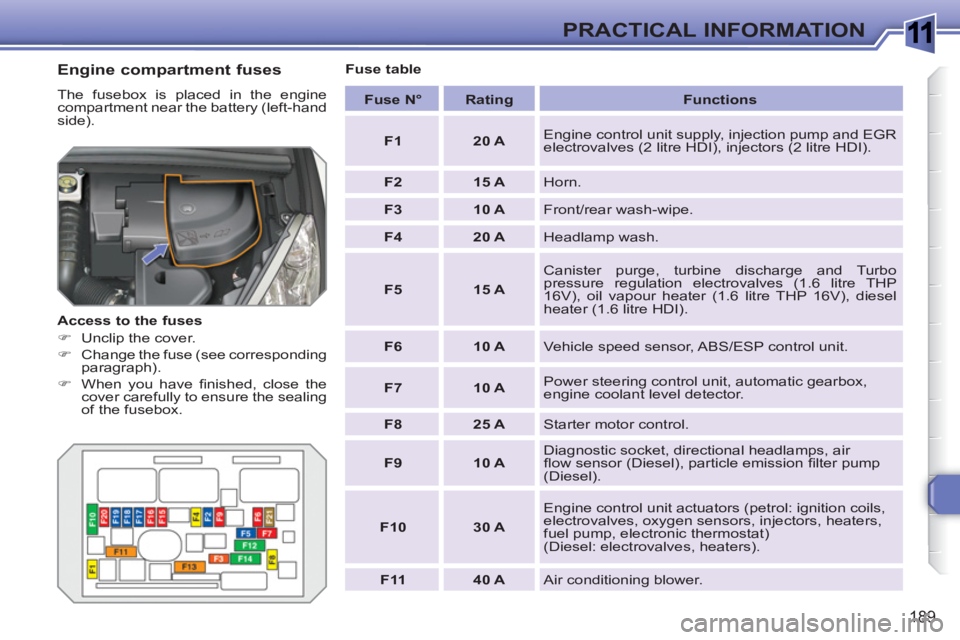Page 94 of 336

i
92
ACCESS
Quality of the fuel used for
petrol engines
The petrol engines are perfectly com-
patible with E10 type petrol biofuels
(containing 10 % ethanol), conforming
to European standards EN 228 and
EN 15376.
E85 type fuels (containing up to 85 %
ethanol) are reserved exclusively for ve-
hicles marketed for the use of this type
of fuel (BioFlex vehicles). The quality of
the ethanol must comply with European
standard EN 15293.
For Brazil only, special vehicles are
marketed to run on fuels containing up
to 100 % ethanol (E100 type).
Quality of the fuel used for
Diesel engines
The Diesel engines are perfectly com-
patible with biofuels which conform to
current and future European standards
(Diesel fuel which complies with stan-
dard EN 590 mixed with a biofuel which
complies with standard EN 14214)
available at the pumps (containing up
to 7 % Fatty Acid Methyl Ester).
The B30 biofuel can be used in cer-
tain Diesel engines; however, this use
is subject to strict application of the
special servicing conditions. Consult a
PEUGEOT dealer.
The use of any other type of (bio)fuel
(vegetable or animal oils, pure or dilut-
ed, domestic fuel...) is strictly prohibited
(risk of damage to the engine and fuel
system).
Special features of BioFlex
engines
A BioFlex vehicle has been designed
to run on unleaded petrol (RON 95 or
RON 98) or ethanol (this is a mixture
containing 85 % ethanol and 15 % un-
leaded petrol, called E85).
So, regardless of the quantity of fuel re-
maining in your tank and irrespective of
its type (RON 95/RON 98, E85 or a mix-
ture of the two), you can fi ll your tank at
any time with unleaded petrol (RON 95
or RON 98) or ethanol (E85).
There is no problem driving on unleaded
petrol only with this vehicle.
In winter conditions, starting the
engine from cold may sometimes
prove diffi cult. During these very
cold periods you are advised to
use unleaded petrol rather than
E85 to ensure optimum starting
conditions.
Page 160 of 336

1
i
158
CHECKS
RUNNING OUT OF FUEL (DIESEL)
If your vehicle is fi tted with an HDI en-
gine, the fuel system must be primed if
you run out of fuel; refer to the engine
compartment view on the "Diesel en-
gine" page.
1.6 litre Turbo HDI engine
�)
Fill the fuel tank with at least fi ve
litres of diesel.
�)
Open the bonnet.
�)
Squeeze and release the priming
pump repeatedly until it hardens
(it may be hard at the fi rst press).
�)
Operate the starter until the engine
starts.
�)
Close the bonnet.
2 litre Turbo HDI engine
�)
Fill the fuel tank with at least fi ve
litres of Diesel.
�)
Open the bonnet.
�)
Unclip the style cover for access to
the priming pump.
�)
Slacken the bleed screw.
�)
Squeeze and release the priming
pump repeatedly until fuel appears
in the transparent pipe with the
green connector.
�)
Retighten the bleed screw.
�)
Operate the starter until the engine
starts.
�)
Put the style cover back in position
and clip it in place.
�)
Close the bonnet.
If the engine does not start fi rst
time, don't keep trying.
Operate the priming pump again,
then the starter motor.
Page 162 of 336
1
160
CHECKS
DIESEL ENGINES
The various caps and covers allow access for checking the levels of the various fl uids, for replacing certain components and
for priming the fuel system.
1.
Power steering reservoir.
2.
Screenwash and headlamp wash
reservoir.
3.
Coolant reservoir.
4.
Brake fl uid reservoir.
5.
Battery/Fuses.
6.
Fusebox.
7.
Air fi lter.
8.
Engine oil dipstick.
9.
Engine oil fi ller cap.
10.
Priming pump * .
11 .
Bleed screw * .
*
According to engine.
Page 191 of 336

1
189
PRACTICAL INFORMATION
Engine compartment fuses
The fusebox is placed in the engine
compartment near the battery (left-hand
side).
Access to the fuses
�)
Unclip the cover.
�)
Change the fuse (see corresponding
paragraph).
�)
When you have fi nished, close the
cover carefully to ensure the sealing
of the fusebox.
Fuse table
Fuse N°
Rating
Functions
F1
20 A
Engine control unit supply, injection pump and EGR
electrovalves (2 litre HDI), injectors (2 litre HDI).
F2
15 A
Horn.
F3
10 A
Front/rear wash-wipe.
F4
20 A
Headlamp wash.
F5
15 A
Canister purge, turbine discharge and Turbo
pressure regulation electrovalves (1.6 litre THP
16V), oil vapour heater (1.6 litre THP 16V), diesel
heater (1.6 litre HDI).
F6
10 A
Vehicle speed sensor, ABS/ESP control unit.
F7
10 A
Power steering control unit, automatic gearbox,
engine coolant level detector.
F8
25 A
Starter motor control.
F9
10 A
Diagnostic socket, directional headlamps, air
fl ow sensor (Diesel), particle emission fi lter pump
(Diesel).
F10
30 A
Engine control unit actuators (petrol: ignition coils,
electrovalves, oxygen sensors, injectors, heaters,
fuel pump, electronic thermostat)
(Diesel: electrovalves, heaters).
F11
40 A
Air conditioning blower.